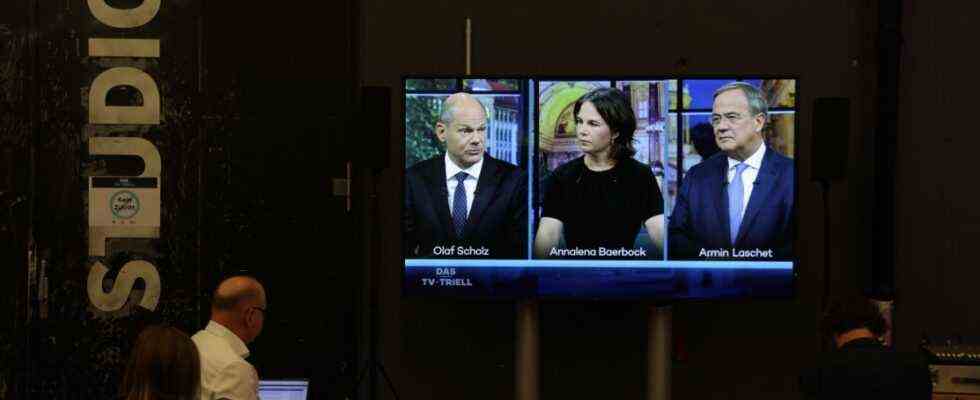It’s done! There has never been a triell, never three TV confrontations in such a constellation before a federal election. But did the arguments really help? A quarter of those eligible to vote was still undecided, it was said at the start of the last meeting of the three aspirants for the Chancellery. The number should not have decreased after that Sunday evening.
The third attempt would have been the chance to try something new a week before the federal election: The TV stations ProSieben, Sat.1 and Kabel Eins would have taken up different topics than before, the candidates Armin Laschet (CDU), Olaf Scholz (SPD) and Annalena Baerbock (Greens) could have drawn attention to themselves with surprising announcements.
But what apparently had to come came: The well-known Triell topics social, climate and corona. And the well-known answers – everything belongs exactly this way or something similar in this election campaign. The usual coalition variants were also chewed through.
There was a little more people involved in this second trio of private broadcasters: Baerbock and Laschet built their family backgrounds into them. Even presenter Linda Zervakis revealed that she had the 30-year-old Mickey Mouse booklet, which was used as an indictment for failure to protect the climate, from her parents’ kiosk. Only Scholz did not allow himself to be carried away into more private or even emotional matters, not even his ears glowed, as in the second triell, when it came to the raid in his ministry. Once Scholz, always Scholz – also as the winner of the Trielle in the lightning polls.
This time Laschet took on the role of the explainer. It suited him better than the last taken by the rowdy attacker. Baerbock, who gained security from Triell to Triell, moderated less and was more aggressive.
The green candidate almost had to defend herself against advances by Scholz, who even let himself be carried away to the sentence: “I support what Ms. Baerbock said.” On this evening, red and green moved noticeably closer, so close that the SPD candidate for chancellor revealed in the end that he would “prefer” to form a coalition with the Greens. Baerbock also let it be known that she would prefer a three-party coalition led by the SPD to a government led by the CDU – in other words, preference for traffic lights in front of Jamaica. Scholz and Baerbock agreed that the Union actually belonged on the opposition bench.
At least there was room for the previously neglected topic of digitization, but not too much specific information emerged in terms of content. The European and foreign policy was left out this time as well. You can blame both the broadcasters and the candidates for that. The signal associated with this is: Germany is related to itself. This is irritating not only for observers in the outside world in view of Germany’s leading role in Europe and the vacuum that Angela Merkel leaves behind as a leading figure on the political stage.
Unlike in the USA, the three TV confrontations were not coordinated. They offered too much of the same and thus bored many, in the worst case scared off voters – a missed opportunity to cover a broader range of topics and to challenge the candidates more. Even the last triell did not help to actually offer decision support for the undecided. For many, all that’s left is the choice-o-mat.

